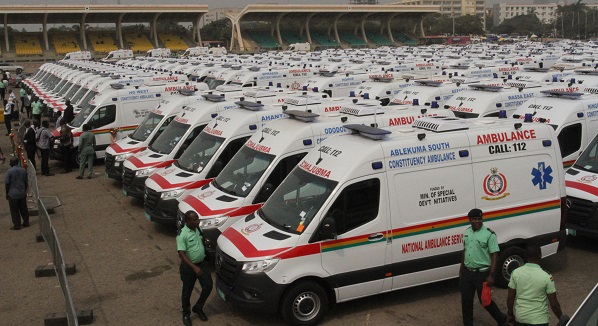The National Ambulance Service (NAS) has responded to 2,797 emergency cases of COVID-19 across the country since March 12, 2020, when Ghana announced its first case.
The Greater Accra Region recorded the highest number of emergency cases of 1,399, followed by the Ashanti Region with 750 cases, with the Bono Region recording the least number of four cases.
The National Coordinator of the COVID-19 Management Team, Mr Yaw Osae, said the figures indicated that the service was making great strides in the management of the situation, adding that the team was dedicated to helping Ghana win the fight against the disease.
Attended cases
Explaining that the cases attended to by the service were about 13 per cent of the total confirmed cases in the country, he said: “it managed to ensure that all the cases were sent to the treatment centres, even as a chunk of the total confirmed cases is being managed at home”.
He said even as the service was putting in much effort to ensure that cases were attended to, it still lacked personal protection equipment (PPE).
Mr Osae said there were 2,000 Emergency Medical Teams (EMTs) across the country, with each team comprising people from the NAS who were in charge of transporting suspected cases to treatment centres.
“In our operations, we assume all cases are potential COVID-19 cases, so although we are not actively involved in the treatment of the infected persons, we are equally exposed to the risk of contracting the disease when we are transporting the sick. We have some of our members who have been infected in the line of duty as a result of the lack of protective gear,” he said.
He said even though the Ministry of Health was doing its best in the battle against the disease, looking at the number of people on the ground, as against the cases attended to and the trend of cases nationwide, it had become necessary for the ministry to increase its supply of PPE to ensure the safety of NAS staff.
He said there had been many instances when some of the NAS personnel could not attend to patients due to the shortage of PPE.
According to him, the situation could have an adverse impact on the operation of the service in relation to the COVID-19.
Commendation
Mr Osae commended the government for the intervention to enhance the operations of the service.
He said previously, there had been about 50 ambulances in the entire country, a situation which affected the smooth discharge of services.
“Now that we have received about 300 ambulances, it’s obvious that our service delivery has improved, particularly since the outbreak of the pandemic. If such an intervention had not been provided, Ghana would have been at great risk with regard to the COVID-19,” Mr Osae said.


Comments are closed.